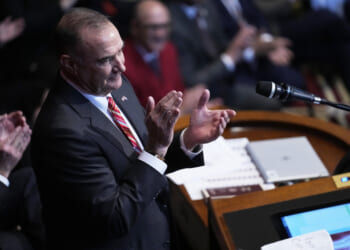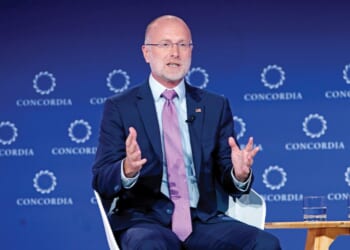The Leftmedia’s entire “fact-checking” industry is utterly corrupt. Its combatants wield facts and sometimes “facts” — mixed with a heavy dose of smug opinion — as weapons to rebut mostly conservative politicians, public figures, or people like your humble team here at The Patriot Post. Their objective, especially as paired with social media giants like Facebook, is not so much to rebuke falsehoods or set the record straight as it is to silence certain speech.
Glenn Kessler, who launched The Fact Checker at The Washington Post as one of the originals in the genre in 2011, is baffled about a few things happening at his former employer. A couple of weeks ago, our Douglas Andrews wrote of Kessler’s decision to take a buyout and leave the Post. The paper’s owner, billionaire Jeff Bezos, began making big moves earlier this year to stop the hemorrhaging of dollars from the business he bought back in 2013. Even billionaires don’t like losing tens of millions of dollars, especially on vanity projects.
Well, now Kessler has launched his own SubStack with an article titled, “Why I left The Washington Post.”
Allow me to suggest a better title: “Why The Washington Post Went So Far Left.”
His article contains some remarkable nuggets about the inner workings of Washington’s premier newspaper. Most of it is inside baseball, and I’m not going to spend time on it. What editor emailed which reporter with vague instructions about vision. Kessler’s “quixotic mission” to “reinstate the ombudsman.” That sort of thing — yawn.
However, a few things are notable. For example, Kessler says he appealed to the paper’s motto, “Democracy Dies in Darkness,” as a reason why his work was of paramount importance and why he was concerned about the paper’s new direction. He neglected to note, however, that the paper chose the motto in clear rebuttal and defiance of President Donald Trump in February 2017. When Trump launched his White House bid, The Washington Post decided its mission was no longer to report the news but to relive the “glory days” of taking down President Richard Nixon via Watergate. Its dedication to the Russia collusion hoax even earned it a Pulitzer.
Note the word “hoax.”
During Kessler’s ombudsman quest, he met with the paper’s new publisher, Will Lewis, who he says asked him, “What should The Post do to appeal more to Fox News viewers?” He continued:
I used to cover diplomacy so I knew how to keep a poker face even as the hair on the back of my neck prickled. “We have to remain true to our journalistic principles,” I said. “We have to tell the truth.” I paused, and added, “They may not like that, because it would conflict with what they’ve been hearing.”
I’m reminded of the instruction of Jesus to first remove the plank from your own eye before worrying about the speck in someone else’s.
That exchange also caught the attention of one of my longtime favorite columnists, The Wall Street Journal’s James Taranto. Regarding the “journalistic principles” Kessler thinks need to remain, Taranto replies, “Kessler’s work played a key role in the Post’s abandonment of those principles.” He added:
One of the most basic journalistic principles is that reporters are obligated to suppress their opinions unless they are openly writing opinion pieces (as I am here). “Fact check” journalism, as I have argued, violates this principle. It is opinion journalism deceptively packaged as a higher-proof, more authoritative formulation of straight news.
Kessler exhibits exactly this in his categorical rejection of Fox News and its viewers. It’s ironic, of course, that Kessler also admits, “I suspect the vast majority of Washington Post readers are left-leaning.” Ya think? He even laments all the subscriptions lost after Bezos famously would not allow a predictable editorial board endorsement of Kamala Harris last year.
The former Pinocchio thrower asserted that “facts aren’t opinions.” Taranto agreed, explaining that this, too, belies Kessler’s bias.
So thorough was Mr. Kessler’s self-deception that he literally didn’t know what he was doing. True enough, “facts aren’t opinions.” His columns contained facts, but so does good opinion journalism. Mr. Kessler fails to see what is in front of his nose — that his assignment of “Pinocchios” isn’t a fact but a pure opinion, crudely and childishly expressed.
Other “fact-checkers” do likewise, of course, issuing such ratings as “Pants on Fire” to both lies and “lies.”
Kessler celebrated his own career, too. “I built and maintained one of the marquee brands of The Post,” he crowed. “My articles were often among the most read on the Post website. Readers flocked to read my fact checks, even if they vehemently disagreed with my findings.”
In other words, his stuff is clickbait.
Unfortunately, the “fact-checking” horde of intellectual gatekeepers holds far too much sway over speech in our country. When I say that, I don’t mean to advance lies. The best way to combat lies is via free speech, not censorship through the logical fallacy of appeal to authority. Kessler was one of the most prominent though police, but he is by no means the last.
















